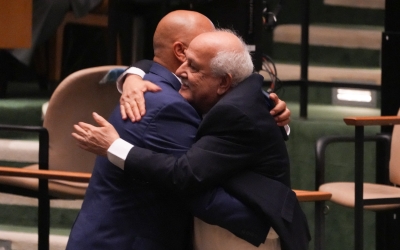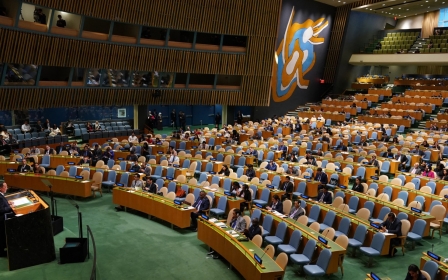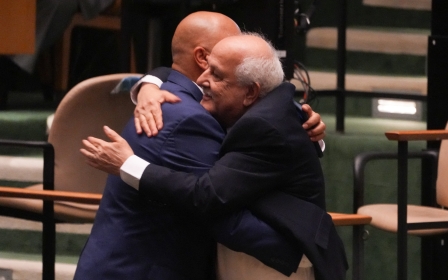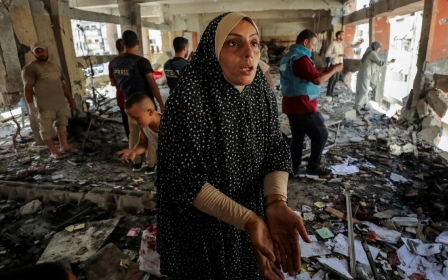UN General Assembly 2024: War on Gaza dominates speeches on day one
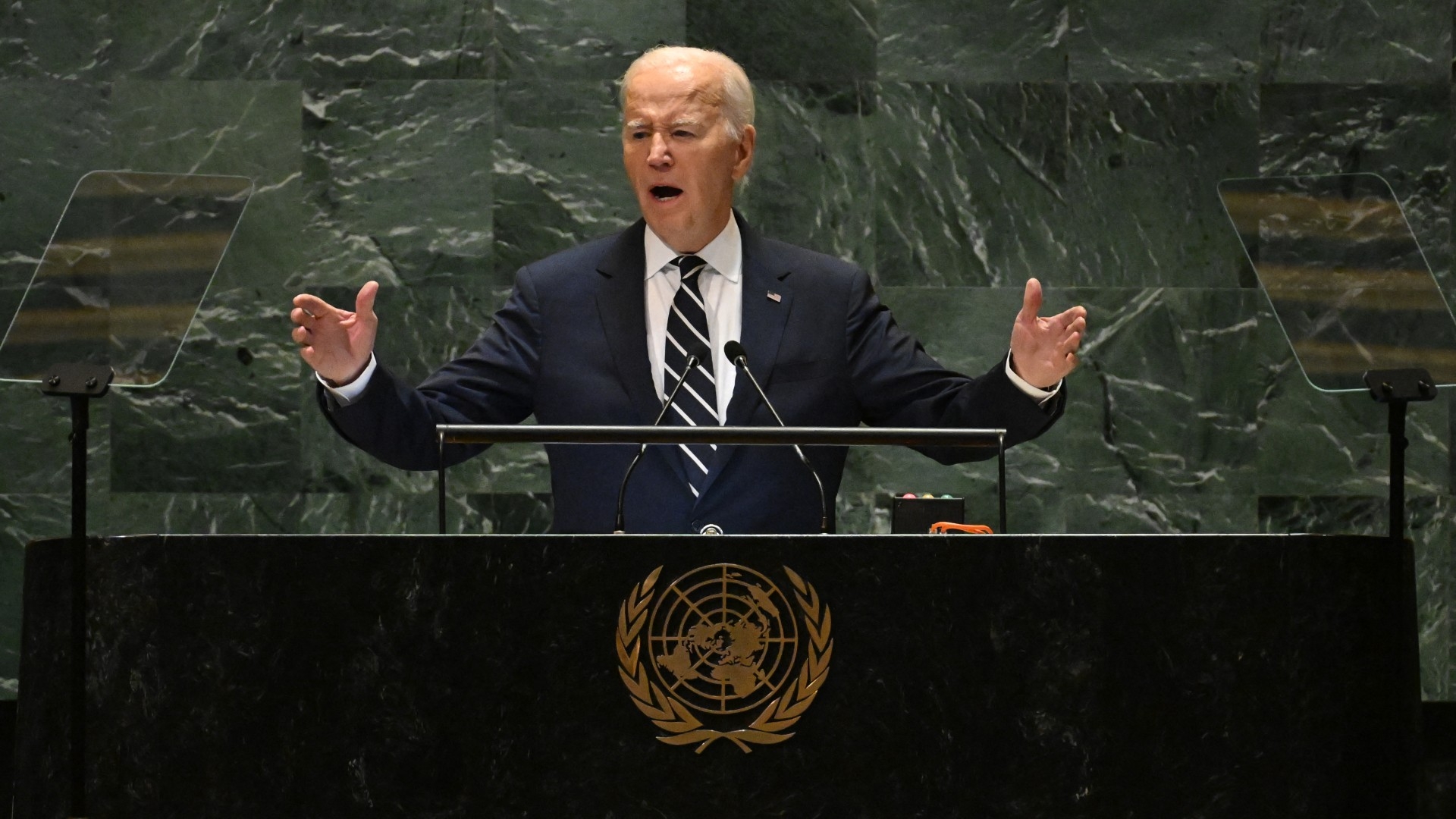
United Nations secretary general Antonio Guterres kicked off the 79th United Nations General Assembly on Tuesday at UN headquarters in New York City with a warning about how a decaying rules-based order has handed several countries a "get out of jail free card", referring to the wars in Gaza, Sudan and Ukraine.
"They can trample international law. They can violate the United Nations Charter," Guterres said during the general debate at the UN. "They can invade another country, lay waste to whole societies, or utterly disregard the welfare of their own people. And nothing will happen.
"The level of impunity in the world is politically indefensible and morally intolerable."
Guterres directly addressed Israel's war in Gaza and the killing of Palestinian civilians.
"Nothing can justify the collective punishment of the Palestinian people. The speed and scale of the killing and destruction in Gaza are unlike anything I have seen in my years as secretary general," Guterres said, which was greeted with a wide round of applause.
New MEE newsletter: Jerusalem Dispatch
Sign up to get the latest insights and analysis on Israel-Palestine, alongside Turkey Unpacked and other MEE newsletters
The secretary general went on to pay tribute to the 200 UN staff killed in Gaza, and honoured the United Nations Relief and Works Agency for Palestine Refugees in the Near East, which was again met with applause.
Guterres went on to condemn Israel's expansion of illegal settlements and "land grabs", and called for the unconditional release of hostages in Gaza, an immediate ceasefire, and an "irreversible" two-state solution. He said that the status quo, with "no dignity" for the Palestinian people, was an impossibility.
In nearly every leader's address on Tuesday, the devastation of Israel's war on Gaza and calls for an immediate ceasefire and a two-state solution featured heavily.
Here are some of the highlights of the first day's general debate:
Joe Biden demands finalising an end to Gaza war
US President Joe Biden made his final address in front of the General Assembly after deciding not to seek another term for president, stepping down to make way for Vice President Kamala Harris to be the Democratic candidate for the upcoming November election.
Biden's remarks started with a brief history of his time in public service until he became president, when he was faced with the decision to end the war in Afghanistan.
“Afghanistan replaced Vietnam as America’s longest war. I was determined to end it and I did. It was a hard decision, but the right decision,” Biden said.
Biden talked about the US defending and upholding the principles of the UN charter and international law when referring to Russia's war in Ukraine, but made no mention of those principles when discussing Israel's war on Gaza.
He started by saying that the world "must not flinch" from the "horrors" of 7 October, in reference to the Hamas-led attack on southern Israel in 2023, adding that any country would have the responsibility to ensure it would not happen again. He repeated claims of sexual assault, many of which have since been debunked, and said the hostages in Gaza were going through hell.
"Innocent civilians in Gaza are also going through hell. Thousands and thousands killed including aid workers, too many families dislocated, crowded in tents facing a dire humanitarian situation. They didn’t ask for this war… that Hamas started."
Biden said the US was working with Qatar and Egypt to reach a deal that was "endorsed by the Security Council", and emphasised the need to end the war.
'Now is the time for the parties to finalise the terms'
- US President Joe Biden
"Now is the time for the parties to finalise the terms. Bring the hostages home, secure security for Israel, and free Gaza from Hamas’s grip. Ease the suffering in Gaza and end this war."
Biden also addressed Israeli settler violence in the occupied West Bank.
"As we look ahead, we must also address the rise of violence against innocent Palestinians in the West Bank and set the conditions for a better future including a two-state solution."
Biden then went on to say that Hezbollah was responsible for dragging Lebanon into conflict with Israel and that a full-scale war was not in "anyone's interest".
On Monday, Israel launched roughly 1,600 strikes across Lebanon, in what was the deadliest day of fighting between Israel and Hezbollah since the 2006 Lebanon war.
The air strikes continued on Tuesday, leaving at least 558 people, including women and children, killed and 1,600 injured, according to Lebanon’s health ministry. Days before the strikes, Israel detonated pagers and walkie-talkies across Lebanon, killing 39 and wounding thousands of others.
Biden said: "Even though the situation has escalated, a diplomatic solution is still possible. In fact, it remains the only path to lasting security to allow the residents of both countries to return to their homes on the border safely."
Biden then pivoted to Iran saying the world must deny “oxygen to terrorist proxies” that have called for more 7 October-like attacks and said the US would never allow Iran to develop a nuclear weapon.
He brought up the war in Sudan, saying that "Gaza is not the only conflict deserving outrage", adding that the world needs to stop arming "these generals".
Biden ended with a quote from the late South African revolutionary and leader, Nelson Mandela, on how to respond to the world's challenges today: “It always seems impossible until it’s done.”
Erdogan urges UN to take measures against Israel
Turkey's President Recep Tayyip Erdogan started his speech by expressing his pleasure in seeing Palestine "in its rightful place among member states", adding that he hoped it was the final step towards full membership.
Referring to the failure to stop Israel's assault on Gaza, Erdogan said, "The UN has failed to fulfil its founding mission and has gradually become a dysfunctional structure."
'The values that the West claims to defend are dying. The truth is dying'
- President Recep Tayyip Erdogan
Erdogan once again raised his oft-repeated motto of "the world is bigger than five", in reference to the UN Security Council. "International justice cannot be left in the will of five privileged member states of the Security Council. The most dramatic example of that is the massacre that has been going on in Gaza for the last 350 days."
He went on to lay out detailed numbers of the loss of life in Gaza, from Palestinian women and children to UN staff, medics, and journalists killed by Israel.
"They (Israel) deliberately hit dozens of hospitals, hundreds of schools, more than 113 ambulances carrying patients. They shredded the charter of the UN from the rostrum of the UN and shamelessly challenged the whole world."
Erdogan, who has led Turkey since 2003, likened the images of prisons for Palestinians in Israel to concentration camps, saying "it clearly shows the barbarism we are facing".
"Gaza has become the world’s largest cemetery for women and children," Erdogan said, and then he recounted the harrowing story of Hind Rajab, the six-year-old child killed by Israeli forces.
"The values that the West claims to defend are dying. The truth is dying. The hopes of humanity to live in a more just world are dying. One by one."
Erdogan accused Israel of disregarding human rights and "trampling on international law at every opportunity. "[It] is practising ethnic cleansing, a clear genocide against a nation, a people and occupying their land step by step".
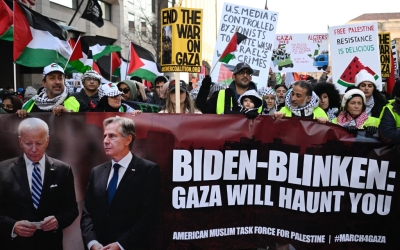
The Turkish president then appeared to address Hamas and other Palestinian groups' "resistance" to Israel.
"The just resistance of the Palestinian people against the occupiers of their land is too noble. It’s too honourable and legitimate to be called illegitimate. It is heroic and it’s noble."
He then made a veiled reference to the US, saying countries unconditionally supporting Israel were "the only reason for Israel’s aggression against the Palestinian people" and were "openly complicit in this massacre".
Erdogan questioned the sincerity of anyone arming Israel while also claiming to be a mediator in the path towards a ceasefire, and demanded that Israel's "stalling and deception" should be dismissed, and in the absence of the implementation of UN Security Council resolution number 2735 (ceasefire), coercive measures against Israel should be put on the agenda.
"Seventy years ago, just as Hitler was stopped by an alliance of humanity, Netanyahu and his murder network must be stopped by an alliance of humanity," Erdogan said.
The Turkish leader blamed Israel for the escalation in violence in Lebanon and said Turkey would fight "for the blood" of Aysenur Ezgi Eygi, who was killed by Israeli forces while protesting in the occupied West Bank.
Erdogan said the Ottoman Empire had always welcomed the Jewish people with open arms when they were fleeing persecution and that the Turkish people oppose antisemitism and have no animosity for the people of Israel, but oppose the policies of the Israeli government.
"Everybody should know this: we will always speak of the truth and speak of what’s right or what’s fair, even if some people are uncomfortable, we will continue to shout out the truth and stand by the righteous and boldly say that we will speak of what we know is right, even though it will hurt some people."
King Abdullah II: 'Every day that we wait is one day too long'
What began as a passionate address at the UN headquarters by King Abdullah II of Jordan quickly transformed into a chilling indictment.
“It often feels that there was not a moment when our world was not in turmoil,” the Jordanian monarch said, spotlighting the dire juncture at which the United Nations finds itself annually. “And yet I cannot recall a time of greater peril than this.”
Abdullah used the occasion to note that the UN’s legitimacy had been under siege for the better part of the year, facing both literal and figurative attacks. The king pointed to the light blue UN flag, which flies over shelters and schools in Gaza, as a symbol of the institution’s compromised position.
'The world is watching. History will judge us by the courage we show'
- King Abdullah of Jordan
“UN aid trucks sit motionless just miles away from starving Palestinians,” Abdullah said, emphasising that it was hardly surprising to see trust in the UN’s foundational principles and ideals eroding, both within the hall and far beyond its walls.
“Humanitarian workers who proudly wear the emblem of this institution are disparaged and targeted. And the rulings of the UN’s International Court of Justice are defied – its opinions disregarded.”
The Jordanian monarch further condemned the global community’s complacency, noting that the world has long accepted the status quo of Israel’s illegal military occupation while merely paying “lip service to the two-state solution”.
“Impunity gathers force. Left unchecked, it gains momentum,” he said.
Abdullah stressed it was the “moral duty of this international community” to establish a protective mechanism for Palestinians across their occupied territories, before categorically rejecting the notion that Arab countries should welcome displaced Palestinians in Jordan as a viable or alternative homeland.
“Let me be very very clear: that will never happen. [Jordan] will never accept the forced displacement of Palestinians. That is a war crime.”
For years, the Arab world has reached out to Israel through the Arab Peace Initiative, offering full recognition and normalisation in exchange for peace and the protection of Palestinian human rights. But, as Abdullah remarked, “consecutive Israeli governments, emboldened by a long history of impunity, have repeatedly rejected [this] peace offering” and instead, opted for the path of bloodshed and military confrontation.
Abdullah said it had never been more evident that the current world order was nothing short of “untenable” for the Palestinian people, and now too, for the Lebanese.
In support of his claim, he referenced the International Court of Justice’s advisory opinion, which declared Israel’s occupation of Palestinian territories as unequivocally illegal back in July. The ICJ's advisory opinion formed a basis for a UN resolution that was overwhelmingly passed earlier this month, calling for an end to Israel's occupation of Palestinian territories.
Ending his address on a sombre note, Abdullah said the world would hold the UN accountable for its policies.
“They will judge whether we, as the United Nations body, will surrender to inaction or fight to uphold the principles that anchor this institution and our world,” he said.
“The world is watching. History will judge us by the courage we show.”
Qatar criticises security plan for Gaza’s post-war future
Taking the stage at the General Assembly on Tuesday, Qatar’s emir, Sheikh Tamim bin Hamad Al Thani, spoke at length about the war in Gaza, criticising western countries for standing behind Israel.
“It is no longer tenable to talk about Israel’s right to defend itself in this context, without being complicit in justifying the crime,” he said.
The Qatari leader also made a jab at the plan for Gaza’s post-war future, which has been reported on in western media for months.
Those reports state that the US has approached several Arab nations, including Saudi Arabia, Bahrain, Egypt, Morocco, and the UAE to take part in a Gaza multinational force that would administer security in Gaza once Israel ends its war. The Financial Times reported that Saudi Arabia had rejected taking part in such a deal.
In July, the UAE backed such a security force in Gaza, with the assistant minister for political affairs in the UAE calling for a “temporary international presence in Gaza” in an opinion article published in The Financial Times.
“We discovered, to our disbelief, that some are still trying to find measures to run Gaza after the war with or without an authority only on the basis of security considerations. And what is meant, of course, is the security of the occupation, not the security of those languishing under the occupation,” Sheikh Tamim said.
'It is no longer tenable to talk about Israel’s right to defend itself in this context, without being complicit in justifying the crime'
- Qatar's emir
“It is this same mindset that has led from one disaster to another. It is this approach that wants to tailor the entire region to fit Israel while looking for circumventions to avoid ending the occupation and work on imposing the rule of one people over another by force.”
Throughout the course of the war on Gaza, Qatar has played the role of mediator between Hamas officials and the US and Israel, and Doha has hosted several rounds of negotiations for a ceasefire.
During his UN address, Sheikh Tamim lambasted Israel and accused it of not trying to seek peace and an end to the war.
“There is no Israeli partner for peace during the current government’s tenure. No peace process is taking place, but rather, there is a genocide,” he said.
“There is no point in talking about security, peace and stability in the region and across the world, if not backed by concrete steps leading to an immediate ceasefire and an end to the Israeli occupation of all Arab territories.”
Iran 'not seeking war' as Israel-Hezbollah fighting rages
Iranian President Masoud Pezeshkian told the UN Generally Assembly that his country is not seeking “war or a quarrel” with anyone, as world leaders watch to see how the Islamic Republic will respond to Israel’s devastating offensive against its Lebanese ally, Hezbollah.
Pezeshkian, a reformist, was elected president in July, following the death of hardliner Ebrahim Raisi in a helicopter crash. His pledge to de-escalate tensions with the West was immediately thrust into uncertainty when Israel assassinated Hamas leader Ismail Haniyeh in Tehran after Pezeshkian’s swearing-in ceremony.
Pezeshkian weighed into fighting between Israel and Hezbollah, which is at its worst since the two sides fought a bloody war in 2006. He indirectly noted Israel’s detonation of thousands of explosive pagers and walkie-talkies last week and air strikes that have killed over 500 Lebanese since Sunday.
“Blind Israeli state terrorism over the last few days, followed by a massive aggression can’t go unanswered,” he said.
In general, however, Iran’s leader avoided discussing Hezbollah by name and sought to portray Iran as a defender of the Palestinian people.
“The world has witnessed the true nature of the Israeli regime. It has witnessed how the Israeli regime has carried out atrocities in Gaza and has murdered in cold blood over 41,000 innocent people.”
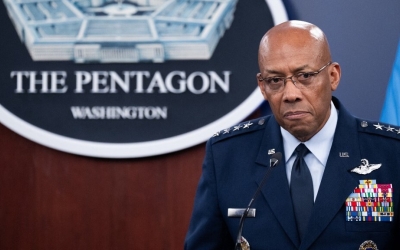
“Its leaders label this genocide, the killing of children, war crimes and state terrorism, as legitimate self-defence. They label hospitals, kindergartens and schools as legitimate military targets,” he added.
“We (Iran) have been siding with people across the world who have flooded the streets in outrage against Israeli atrocities,” he added.
Pezeshkian reaffirmed Tehran’s opposition to the State of Israel defined by Zionism, saying that Iran wanted a referendum to create a Palestinian state “with Muslims, Christians and Jews living together”.
Pezeshkian also said Iran was surrounded by hostile powers, addressing the American public directly.
“It is not Iran that has established military bases on your border, it is not Iran that has imposed sanctions and it is not Iran that has obstructed your trade relations with the world,” he said.
On Ukraine, where the US and European states have accused Iran of sending missiles and drones to Russia, Pezeshkian said Tehran wanted an “urgent end” to fighting.
Despite fighting that has brought the region to a knifes-edge, Pezeshkian appeared to try and salvage his promise to engage with the West.
He said Iran was ready to work with parties to the now defunct 2015 nuclear deal, formally called the Joint Comprehensive Plan of Action (JCPOA), and accused the previous administration of US President Donald Trump of pursuing a “coercive” policy on Iran. Trump unilaterally withdrew from the nuclear deal in 2018. He ramped up sanctions enforcement on Iran and oversaw the assassination of senior Iranian general, Qassem Soleimani.
“The policy of so-called maximum pressure was in fact implemented against the Iranian people when Iran was fulfilling all its obligations under the JCPOA,” he said.
Middle East Eye delivers independent and unrivalled coverage and analysis of the Middle East, North Africa and beyond. To learn more about republishing this content and the associated fees, please fill out this form. More about MEE can be found here.


